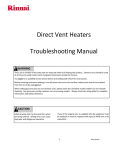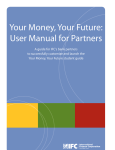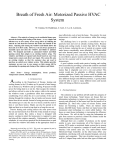Download Save On Home Energy Costs
Transcript
Volume 7 #7 • Home Energy Savings • Inspiring Thoughts • Industry News • Client Reminders • College Students’ Guide To Debt • Does Using Credit Encourage You To Spend More? 1-800-655-6303 Welcome to the Freedom Debt Relief monthly newsletter! As part of our ongoing goal to enhance our services, we will be sending you a monthly newsletter filled with interesting articles and helpful financial tips and advice. We hope you enjoy this issue, and that you find the enclosed information helpful as you continue on the road to financial freedom. Save On Home Energy Costs A ccording to The California Energy Commission Consumer Energy Center, the average home spends about $1,900 a year on energy costs. However, there are low-cost ways to cut back on your electric bills during the summer without having to compromise your comfort. A few simple tricks can help you save. Thermostat Basics According to Alliance to Save Energy, a programmable thermostat can save you up to 10 percent a year on your heating and cooling bills. Purchasing a good thermostat may save you money in the long run. It is a good idea to set your thermostat to 78 degrees when you are home and 85 degrees or off when you are away. If you are uncertain of how to operate your thermostat you can check with your local power company to see if they have a support staff that can help you. Or, call the toll-free customer support number in your user’s manual. Energy Drainers You may already practice the good habit of turning off lights in your home when they aren’t in use. But did you know that some of your appliances and electronic devices can be wasting power without your knowledge – even when they are turned off? According to www.Bankrate.com, you should try to look for power-draining devices or electronics that stay on even when powered off. Try to hook things up to a surge protector that connects to a wall outlet. When the surge switch is off, there won’t be any power to drain. Every Day Appliance Savings You can save simply when it comes to using many frequently-used home appliances. For example, consider skipping the “dry” cycle on your dishwasher. You could hand-dry dishes or dry them in a dish rack. When it comes to washing clothes, using cold water may save you up to 14 percent of your total power bill. Try drying clothes on a clothesline or a laundry rack if possible. Tired Of The AC? It should be sufficient for you to keep your air conditioner at a reasonable setting. Also, keep in mind that good insulation can make a difference in how hard your air conditioner works to keep your home cool. Try to replace your air conditioner filters regularly. The United States Department of Energy estimates that doing so can generate a five to 15 percent energy savings and improve the quality of the air you breathe at home. For more information on how to save money and energy, visit the U.S. Department of Energy website at www.EnergySavers.gov. Ceiling Fans & Energy Savings According to www.PlanetGreen.Discovery. com, ceiling fans can help you reduce your energy costs throughout the year. In winter months you may save up to 10 percent by running your ceiling fan in a clockwise direction. Doing so causes the warm air to rise and then recirculate throughout the room without causing a cool breeze. During the summer you can save as much as 40 percent in energy costs by running your ceiling fan in a counter-clockwise direction. For tips on properly installing your ceiling fan to get the most savings, visit www.EnergyStar. gov and type ‘Ceiling Fan Installation and Usage Tips’ in the search field. Home Energy Quiz D o you know your home energy facts? Test your knowledge here. You can find the answers on page 2 of this newsletter. 1. Purchasing a larger air conditioner will actually save you money during the long, hot summer months. True False 2. Keeping ceiling fans turned on keeps cool air circulating through your home and should entirely reduce the need for air conditioning. True False 3. If you have a lot of glare and heat radiating on or through the windows in your home or office in the summertime, you need to completely replace them. True False 4. The direction in which you operate your ceiling fan blades can dictate how much you save each season on your energy bills. True False 5. You should change the air filter on your furnace at least every three months to run at its maximum efficiency. True False us and they ultimately enroll in FDR’s debt resolution program. There is no limit to how many referrals you can make or how much money you can earn. Please see http://www. freedomdebtrelief.com/ambassadors/ for complete details. Visit Us On The Web Did you know that you can view your account information online? Go to www. freedomdebtrelief.com and click on the tab “Current Clients.” If you already have an online user account, enter your email address and password. Otherwise, click the link “Register Here” and follow the instructions to validate your information and create a user account. Please Be Prepared For And Respond To Our Correspondence Be prepared to be contacted by one of your negotiators to approve a settlement that has Money-Saving Tips Can Help College Students Avoid Debt I f you are a college student, below are some tips that may help you reduce some of your costs so that you will be less likely to succumb to the allure of credit, taking on more debt. Create A Budget. You may want to create a budget and learn to stick to it. Budgeting is a valuable skill that you can use after you complete your education. The financial web sites listed below have budgeting tools and calculators that cater to young adults and college students. • You Can Deal With It: www.YouCanDealWithIt.com • What’s My Score www.WhatsMyScore.org • Truth About Credit (CARE) Program: www.TruthAboutCredit.org Save Money On Textbooks. Campus bookstores usually sell new textbooks at been negotiated for you. Some settlements are very time sensitive and require immediate approval. It is necessary that you respond promptly to our notice by either replying “I Approve” to your negotiator’s email or by visiting us on the web via your client portal (see Visit Us On The Web above). You may also call 1-800-655-6303 and choose ‘Option 3’ to approve the settlement verbally. Refer-A-Friend To Freedom Debt Relief And Earn $250 Starting September 1, 2011, if you know a friend or family member who could use our help, you will earn $250 if you refer them to premium prices. Instead of purchasing a new textbook, you may want to consider borrowing books or buying used books from students that previously took that class. Look for signs on campus or see if the university supplies a list of classified ads. You may also consult online used book sources such as www.TextBookx.com, www.Half.com and the textbook section of www.BarnesAndNoble. com and www.Amazon.com. Also, remember to sell your textbooks at the end of the semester for extra cash. If you need software for a particular class, web sites such as www.JourneyEd.com and www.Gradware.com offer popular software at discounted prices for students. Get A Part-Time Job. If it will fit into your course schedule, consider getting a parttime job to cover some of the costs associated with college. Consult the career services division of the college or perhaps your school may offer a work-study program, in which you can work on campus. Some colleges and universities may also allow students to apply work-study earnings toward tuition. Consider Alternatives To Credit. Instead of a traditional credit card, you may consider a prepaid debit card that includes various features geared to young adults. Unlike credit cards, they carry no risk of debt or overdraft fees; cardholders can only spend the amount of money prepaid onto the card. Additionally, prepaid cards offer the protection of a credit card and the opportunity to build credit. The cards are generally accepted at the same places as credit and debit cards. Some prepaid cards come with safety features like allowing parents to monitor spending or requiring authorization for online use. *** E-mail: support@ freedomdebtrelief. com Customer Service: 1-800-655-6303 FAX No: 650-393-6800 Hours of Operation: Mon-Thurs: 6:00 a.m. – 6:00 p.m. PST Fri: 6:00 a.m. – 5:00 p.m. PST Sat: 7:00 a.m. – 11:00 a.m. PST Home Energy Quiz Answers 1. FALSE: A room air conditioner that’s too big for the area it is supposed to cool will perform less efficiently and less effectively than a smaller, properly sized unit. 2. FALSE: You should only turn on ceiling fans when you’re in the room with them. Be sure the blades are pointing down in summer and up in the winter. 3. FALSE: A replacement may not be necessary but you can try a few tricks to help keep your rooms cooler. You may be able to reduce solar heat gain in hot summer months by using drapes, blinds, or solar film to shade them from the inside. This step may help you save electricity since your A/C won’t need to perform more frequent cycles to keep your rooms cool due to the added heat. 4. TRUE: See ‘Ceiling Fans & Energy Savings’ in the article on Page 1 for tips on how to properly use a ceiling fan throughout the year. 5. TRUE: Clogged, dirty filters really reduce efficiency of your system and the air quality in your home, potentially costing you more money. Industry News Consumers Alerted to Declining Bankruptcy Rates A ccording to the American Bankruptcy Institute, consumer bankruptcy filings fell eight percent in the first half of 2011. According to MSNBC.com, consumer bankruptcy filings for the first six months of 2011 totaled 709,303, compared to 770,117 bankruptcy filings during the same period in 2010. Declining bankruptcy rates may not indicate a recovering economy, especially considering continued unemployment. Unemployment actually rose slightly to 9.2 percent in June, and almost half of the 14 million jobless Americans have now sought work for six months or longer, according to the Department of Labor. This statistic may reveal that Americans are turning to alternatives other than bankruptcy to resolve their debt issues. Debt settlement has become an increasingly established alternative to bankruptcy, growing in popularity over the years. This has led to an increase in regulation of the debt settlement industry, giving consumers more protection. Credit Card Customers Advised Of New Pricing Rule Amendment A new amendment recently went into effect which requires that creditors provide consumers more information about setting or adjusting credit terms. As a result of a rule issued by the Federal Reserve Board and the Federal Trade Commission, creditors must disclose a “risk-based pricing” notice to consumers when their credit score is used for “risk-based pricing,” or the practice of determining credit terms and prices based on a consumer’s creditworthiness. According to the FTC, creditors now must provide consumers with their credit scores—in addition to the “risk-based pricing” notice and other credit information—when their credit history will negatively affect current terms. This amendment is a result of the 2010 Dodd-Frank Wall Street Reform and Consumer Protection Act. Alternatively, creditors can provide a free credit score to all applicants. The legislation should alert consumers when they are being charged more as a result of negative marks on their credit reports. In addition, the rule will help ensure that consumers do not needlessly pay for mistakes on their credit reports as it allows them the option to check the accuracy of their reports for free. Credit Corner As you strive to settle your debts, most of you have made a commitment to rely on cash instead of credit cards. After you complete your debt negotiation program, you will probably want to re-establish your credit. As you probably know, credit cards can cause serious financial problems if they are not used properly. Periodically, this column will discuss a credit card issue and give you tips on responsible credit card use. This month’s topic is sales tactics to make you spend more with credit. R esearch indicates that consumers usually spend more when using credit cards. According to Cardweb Research (www.CardWeb. com), consumers spend over 200 percent more when they pay with a credit card. Therefore, stores may use many tricks and gimmicks to encourage credit card spending. Below are some store sales tactics that you should watch out for in case you ever feel tempted to splurge with a credit card. Requiring A Certain Amount To Be Spent. It is common for today’s consumer to use a credit card as payment for small items such as the morning papers or a pizza delivery. According to Convenience Store News, an estimated 45 million Americans are willing to use credit or debit cards for purchases of $5 or less. Consider using cash for small purchases. If a store requires you to make a minimum purchase amount, you will most likely buy more than you need. Offering Special Savings For Account Applications. Many sales associates at chain retailers try to persuade customers to complete a credit card application, telling them that they can save a certain percentage off of their purchase. It is usually easy to apply, sometimes requiring an applicant to swipe another major credit card along with entering some other basic information into a pin pad. If approved, the cashier issues a temporary credit card so the customer can use it until they receive the plastic one in the mail. When it comes time to re-establish your credit, you may want to think twice about opening up a store account at a register. Checkout lines and retail stores are usually busy and hectic. This type of environment may cause you to make impulsive decisions. If you really want a credit card from a particular store, it may be best to think about the choice before you make a snap decision just to save 10 or 20 percent. Keeping a revolving balance on the card can quickly surpass that amount of savings. Buy Now And Pay Later. Stores that sell furniture and large appliances are notorious for offering deferred payment sales. These sales also promote that there will be “no interest” during the deferment period, which also may sound like a great deal. Before agreeing to this type of contract, be sure that you read all the fine print associated with the contract. Consider whether you can pay off the balance within the deferment period. Keep in mind that your situation may change during this time and you may not be able to make payments as early as you would like. Also, consider how long it will take to pay off the balance if you simply pay the minimum. Online calculators such as “The True Cost of Paying the Minimum” can be found on www.Bankrate.com under the Debt Management tab. You can also try “The Deferred Payment” calculator at www. Banksite.com to find out how much interest you will accrue. If it will take you ten years to pay off a piece of furniture by simply paying the minimum, consider what it will look like at that time. Inspiring Thoughts With self-discipline most anything is possible. ~Theodore Roosevelt consumers to use credit to cover daily living expenses. Establishing a budget does not seem necessary when you can simply charge a large order of groceries instead of waiting until payday. As most of us know, these habits can cause a dangerous cycle of debt. While you are “waiting” for all your debts to be settled, below are some tips that may help you now and throughout your financial future. Y ou have probably heard the saying, “Good things come to those who wait.” This piece of inspirational advice could relate to your current debt situation. As much as you would like to, you will probably not get out of debt overnight. It may require several years for all of your debts to be settled. Although times may seem bleak on some days and you feel like your financial goals are impossible to achieve, there may be a part of you that knows you must find the strength to persevere. In our consumer-driven society, it may be difficult to think that delayed gratification brings about good fortune. If you want to make a purchase, credit card companies want you to buy it immediately. Why wait when you can have it now? Generous credit lines also allow Stay The Course. There may be times when it seems like collectors constantly call and the unexpected expenses are endless. Despite these hard times, try to stay strong and keep in mind that good things come to those who wait. Keep Learning. You can also use this time to educate yourself on various financial issues. Check out budgeting tools and calculators online. Borrow books from your local library on money-related topics. Be Good To Yourself. Working towards a debt-free lifestyle does not mean you have to deprive yourself. When you reach short-term goals throughout your program, reward yourself. It does not have to be extravagant, just small pleasures that will encourage you to move forward. Remain Positive. Stay focused on your goals. Be mindful of the blessings in your life and keep your proudest accomplishments in mind. The Freedom Debt Relief newsletter is published by The Premier Institute for Financial Freedom. While articles in this newsletter are factual and accurate, they are not intended to replace the advice of professional financial, accounting, and/or legal advisers. As with all decisions regarding your finances, the advice, techniques, ideas and suggestions offered herein should be followed under the supervision of the appropriate competent professional. 1875 South Grant Street Suite 400 San Mateo, CA 94402 Phone: (800) 655-6303 FAX: (650) 897-8800



















